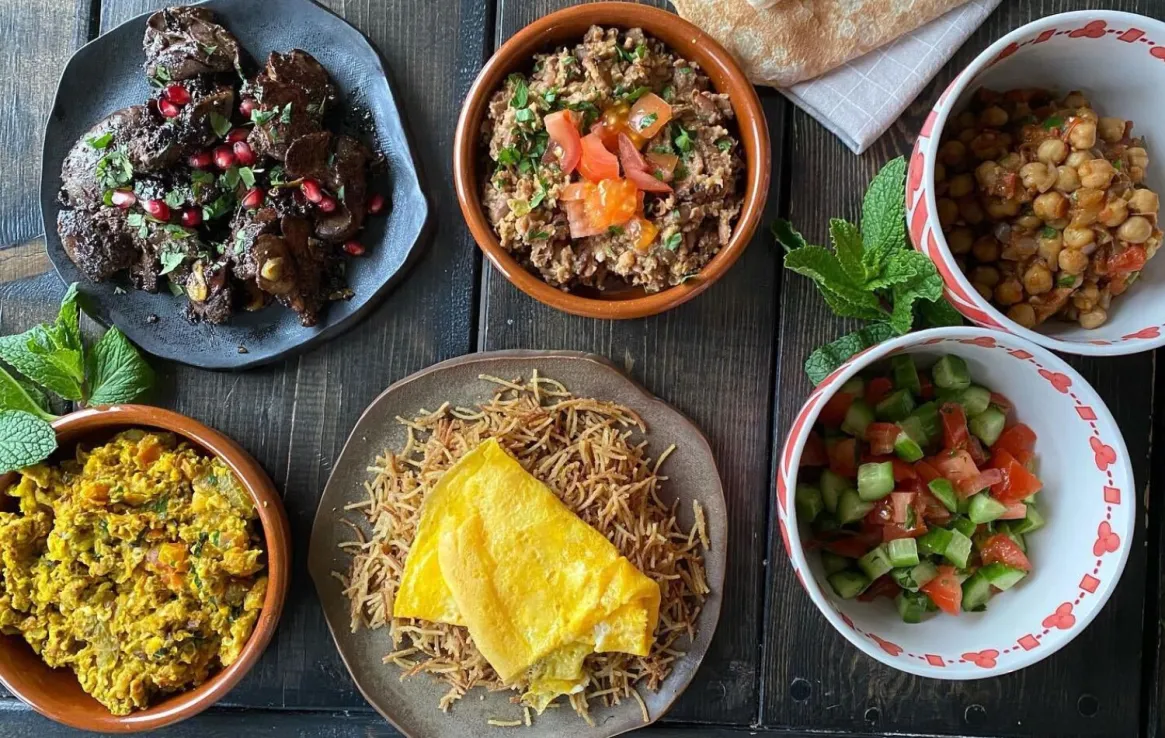The Heart of Togetherness
In Bahraini culture, family is not simply an aspect of life; it is the very center of it. Family meals embody this essence, serving as more than just a way to satisfy hunger. They symbolize unity, warmth, and love. Around the table, generations gather to exchange stories, celebrate traditions, and reinforce values that have been passed down for centuries. In Bahrain, mealtimes are sacred moments where bonds are strengthened and respect for heritage is reaffirmed.
The concept of sitting together for a shared meal goes far beyond eating. It represents a space where everyone, from the youngest child to the eldest grandparent, feels a sense of belonging. In an increasingly fast-paced modern world, family meals in Bahraini households remain a powerful reminder that relationships come first.
The Traditional Bahraini Table
The Bahraini table is not only a spread of delicious dishes but a cultural symbol reflecting generosity and hospitality. Meals often consist of rice, meat, and fish, cooked with aromatic spices that carry the flavors of the island’s heritage. Dishes like machboos, harees, and ghoozi are staples, representing the balance between nourishment and tradition.
Food in Bahrain is more than sustenance; it is a language of love. Mothers, grandmothers, and daughters often work together to prepare meals, using recipes that have been preserved through oral tradition. Each dish carries a story, a history of ancestors who cherished the same flavors centuries ago. The dining table becomes a place where history is relived with every bite.
A Celebration of Hospitality
Hospitality is deeply rooted in Bahraini culture, and family meals reflect this tradition. Guests are often invited to join in, and they are welcomed with warmth and generosity. Serving abundant food is considered an honor, and it reflects the value of sharing that is central to Bahraini identity.
Even in everyday meals, the spirit of hospitality shines through. Whether it is an extended family gathering or an intimate evening at home, Bahraini households emphasize that food is meant to be enjoyed together. This spirit builds not only stronger families but also stronger communities, as it creates opportunities for connection and understanding.

The Symbolism of Sitting Together
The act of gathering for a family meal carries deep symbolism. It represents equality and unity, as everyone sits side by side, sharing the same food. The seating arrangement often reflects respect, with elders at the head of the table, symbolizing wisdom and guidance.
Children learn values such as patience, gratitude, and respect at the dining table. They observe traditions, understand their role in the family, and absorb lessons about cooperation. For Bahraini families, the dinner table becomes a classroom of life, where stories teach as much as textbooks and food nourishes both the body and the soul.
Family Meals and Cultural Identity
In Bahrain, culture and identity are inseparable from family traditions, and meals serve as a vital part of this heritage. Through food, language, and conversation, families pass down their cultural identity to the next generation. The act of cooking together, setting the table, and sharing food reinforces the cultural values that make Bahrain unique.
Even as globalization brings new influences, Bahraini families preserve their identity by holding onto the rituals of shared meals. They are not simply cooking and eating; they are protecting their heritage. This is how children grow up with a deep sense of who they are and where they come from.
Religious and Festive Significance
Family meals in Bahraini culture are particularly significant during religious and festive occasions. During the holy month of Ramadan, for instance, families break their fast together at iftar, a time marked by reflection, gratitude, and unity. The act of sharing food during such moments is a reminder of spiritual values and communal solidarity.
On Eid celebrations, extended families come together for grand feasts, where laughter and joy fill the air. Traditional dishes, sweets, and drinks are prepared with care, ensuring that everyone feels included in the celebration. These festive meals go beyond celebration; they create memories that last a lifetime and reinforce the role of family as the cornerstone of society.
Modern Challenges to Family Meals
Like many cultures, Bahrain faces the challenges of modern life. Busy work schedules, school commitments, and the fast pace of urban living sometimes threaten the tradition of family meals. Technology and digital distractions have also shifted focus away from face-to-face conversations at the dinner table.
Yet, despite these challenges, many Bahraini families continue to prioritize mealtimes. They recognize that even a simple shared breakfast or dinner can keep the bond alive. Efforts to preserve this tradition reflect the resilience of Bahraini culture, where family remains a priority regardless of external changes.
Adapting Tradition in Contemporary Times
Bahraini families have found creative ways to adapt traditional mealtime practices to modern life. For some, weekends become dedicated times for larger family gatherings. Others integrate modern recipes while keeping the spirit of togetherness intact. The goal is not to resist change but to blend it with heritage in a way that respects both tradition and progress.
Restaurants and cafes in Bahrain also reflect this cultural balance, where dining out with family is seen as an extension of home dining. Families gather in public spaces with the same warmth and connection, showing that the essence of family meals transcends location.
The Emotional Impact of Shared Meals
Family meals carry immense emotional value. They create a sense of security, belonging, and love for every member of the family. For children, knowing that they will sit down with their family for meals provides comfort and stability. For parents, it becomes an opportunity to listen, guide, and bond with their children.
The laughter shared over a meal, the comfort of familiar flavors, and the presence of loved ones all create memories that remain long after the food is gone. These emotional connections make family meals one of the most enduring traditions in Bahraini culture.
Passing Traditions Across Generations
One of the most beautiful aspects of Bahraini family meals is how traditions are passed from one generation to another. Grandparents teach grandchildren the art of cooking traditional dishes, while parents encourage their children to contribute to meal preparations. This exchange of skills and knowledge ensures that heritage remains alive.
Cooking and eating together is not only about preserving recipes but also about transmitting values. Patience, respect, and appreciation are embedded in the process. Children grow up not only with a taste for Bahraini cuisine but with a love for their family’s traditions and stories.
Building Stronger Communities Through Meals
The role of family meals extends beyond the household into the larger community. Shared meals create a culture of generosity and kindness, values that reflect in how Bahrainis interact with their neighbors and society. When families practice hospitality at home, it naturally extends into the way they treat others in the community.
This cultural emphasis on togetherness has a ripple effect, strengthening social ties and creating unity within Bahraini society. Family meals, therefore, are not only private rituals but also public symbols of harmony and cooperation.
The Role of Women in Family Meals
In Bahraini households, women traditionally hold a central role in preparing and serving meals. While men also participate, it is often mothers and grandmothers who preserve the culinary traditions. Their knowledge of recipes, cooking techniques, and presentation styles ensures that authenticity is maintained.
However, in modern times, roles are evolving. Men and children increasingly contribute to meal preparation, reflecting changing dynamics while honoring tradition. This shift not only eases responsibilities but also reinforces the value of cooperation and shared responsibility in the family.

The Influence of Globalization on Bahraini Meals
Globalization has introduced new cuisines and dining habits into Bahrain, from fast food to international restaurants. While this has diversified the culinary landscape, Bahraini families continue to hold onto their traditional meals as symbols of identity.
Many families strike a balance by incorporating global dishes into their meals while ensuring that traditional Bahraini foods remain central. This blending reflects openness to the world while maintaining strong cultural roots.
The Role of Meals in Emotional Healing
Meals are not only about celebration but also about healing. In times of grief or difficulty, Bahraini families gather for meals to support one another emotionally. Food becomes a comfort, and the act of sitting together provides strength and reassurance.
This aspect of family meals highlights their emotional depth. They serve as a reminder that no one is alone in their struggles. The table becomes a safe space where love and solidarity are expressed without words, only through presence and care.
Looking Toward the Future
As Bahrain continues to grow and modernize, family meals will remain an essential part of its cultural fabric. They are traditions that will continue to evolve while holding firm to their core purpose: bringing families together.
Future generations may dine in new settings, use different recipes, or embrace global influences, but the spirit of family meals will endure. The values of love, unity, respect, and generosity that define Bahraini meals will always remain at the heart of the culture.
Conclusion: A Tradition That Nourishes Beyond Food
The role of family meals in Bahraini culture is profound and enduring. They are not only about food but about connection, heritage, and love. Around the dining table, families celebrate traditions, share stories, and create memories that span lifetimes.
In a world where time is increasingly scarce, Bahraini families hold onto the value of eating together as a way to remind themselves of what truly matters. The dining table is a place of nourishment, not just for the body but for the soul. It is here that the essence of Bahraini culture comes alive through shared meals that keep families, communities, and traditions strong.
Do follow Gulf Magazine on Instagram.
Also Read – Fresh Flavors of Bahrain: A Journey Through Seafood Markets



